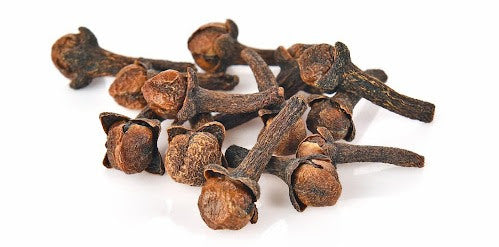Cloves Benefits and Uses

In this blog I'm sharing the key benefits and uses of cloves. Cloves are well known for their addition to Chai, pumpkin pie, mulled wine, and tagines. I always have a jarful on the kitchen shelf.
Cloves, scientifically known as Syzygium aromaticum, are renowned for their warm, aromatic flavour and numerous medicinal properties. The flower buds are picked by hand when they are almost ready to open. They are then dried in the sun until they harden.
Culinary Uses
Flavours
Cloves have a strong, pungent and slightly sweet taste as its primary flavour. This is followed by hints of bitterness and astringency as secondary flavours. Its aroma can be described as rich, spicy and aromatic with floral undertones.
Common Culinary Applications
Cloves are a versatile spice used in both sweet and savoury dishes. They add depth and complexity to recipes, especially in spice blends like garam masala and pumpkin spice. Common culinary applications include:
- Sweets - poached fruit, cakes, biscuits and pies.
- Savoury dishes - curries, stews, braises, marinades and pickles.
- Drinks - mulled wine and juices, add to tea or coffee.
Pairing
Cloves pair extremely well with cinnamon, ginger, nutmeg and cardamom. Many people's first association with cloves would be in combination with one of those spices. Others include bay leaf and fenugreek, both excellent savoury pairings.

Global Cuisine Use
Cloves are an important of the cuisines of many cultures worldwide. Here are a few examples:
- Indian Cuisine: Biryani - a fragrant rice dish with whole spices including cloves, cardamom, and cinnamon.
- European Cuisine: Mulled Wine (also known as Gluhwein) - a spiced version of mulled wine featuring cloves, cinnamon, star anise, and citrus fruits enjoyed as a staple throughout Europe.
- Indonesian Cuisine: Rendang - a slow-cooked beef dish simmered in a rich, spicy coconut sauce with cloves, cinnamon, and lemongrass.
- African Cuisine: Moroccan Tagine - a stew cooked in a clay pot with a spice blend including cloves, enhancing dishes like lamb or vegetable tagine.

Medicinal Uses
Cloves possess several medicinal properties, including anti-inflammatory, antimicrobial, analgesic and antioxidant effects.
- Traditionally used to alleviate digestive issues and soothe respiratory ailments.
- Toothache - valued for its analgesic properties and is often used topically for tooth pain relief.
- Believed to promote overall oral health and support immune function.
Other Uses
- Cleaning Solutions: You can infuse vinegar or vodka with cloves, herbs and citrus to create a multipurpose cleaner for countertops, floors, and surfaces. This vinegar helps remove and deter mould. See the recipe below.
- Wardrobe Freshness: Place cloves in sachets or small cloth bags and place them in your wardrobe or drawers to keep clothes smelling fresh and to deter moths and other pests from damaging your garments.
- Craft: Cloves are useful for decorating candles and wreaths. Use in potpourri or citrus pomanders.

Lemon Clove and Rosemary Cleaning Vinegar
Ingredients:
- 1 litre of white vinegar
- ¼ cup of clove buds
- 6 stems of rosemary
- The peel of 1 lemon
Method:
- Put the sprigs of rosemary, cloves and the sliced lemon peel into a 1-litre bottle.
- Fill the bottle to the brim with vinegar.
- Seal the bottle and leave for 2 weeks for optimum strength. (If you’re in a hurry, wait a minimum of 24 hours before use).
- Once ready, strain and bottle.
- To use half fill a spray bottle with infused vinegar and top up with water.
If you're interested in a few other herbal cleaning recipes, check out our 'How to Make Herba Cleaning Vinegar' video.



